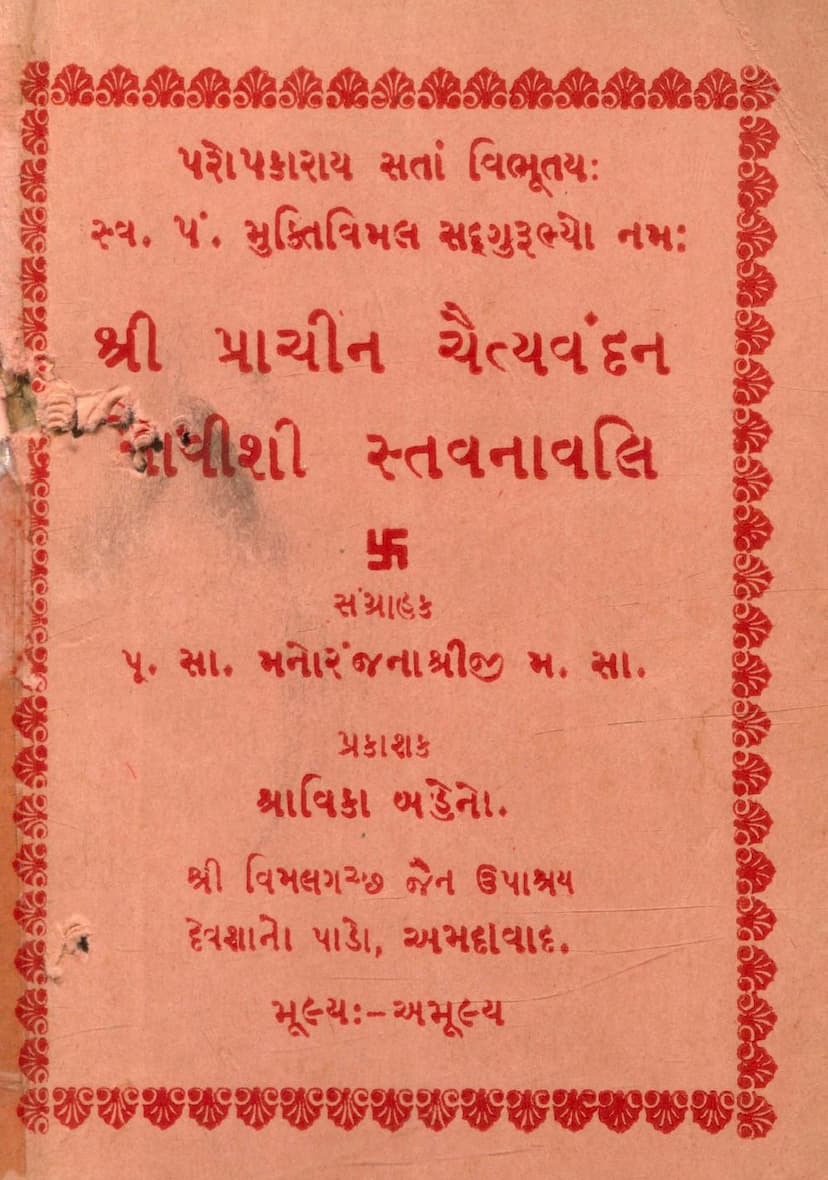Prachin Chaityavandan Stavanadi Sangraha
Added to library: September 2, 2025

Summary
Here's a comprehensive summary of the Jain text "Prachin Chaityavandan Stavanadi Sangraha" by Manoranjanashreeji, based on the provided pages:
Title: Prachin Chaityavandan Stavanadi Sangraha (Collection of Ancient Chaityavandan and Stotras)
Author: Pujya Sadhvi Manoranjanashreeji M.S.
Publisher: Seth Mulji Devji (Published in 1967/1966 AD corresponding to V.S. 2023, Veer Samvat 2493)
Introduction and Purpose: The book is a collection of ancient Jain devotional songs (stotras) and prayers (chaityavandans) compiled with the guidance of Pujya Sadhvi Lakshirishri M.S. The primary aim is to preserve and disseminate these traditional Jain devotional practices. The publication is dedicated to the gurus, with a special mention of P. Muktimlav and P. Mahendravimal. It also acknowledges the generous contributions of the Shravika sisters, Champaben Samal and Kankuben Samal, who actively participated in the religious activities of the Sangh.
Content Overview: The book primarily consists of various stotras (hymns of praise) dedicated to different Tirthankaras (Jain spiritual teachers) and other significant figures and concepts within Jainism. The structure includes:
- Mangalacharan (Invocation): The book begins with auspicious invocations, including the Navkar Mantra (Namo Arihantanam, etc.) and verses praising the five supreme beings (Panch Parameshthi).
- Stotras to Tirthankaras: A significant portion of the book features devotional hymns dedicated to each of the 24 Tirthankaras, starting from Rishabhdev and ending with Mahavir Swami. Each stotra typically describes the Tirthankara's life, virtues, and miraculous powers, encouraging devotion and spiritual reflection. Examples include stotras for:
- Rishabhdev
- Ajitnath
- Sambhavnath
- Abhinandanath
- Sumatinath
- Padmaprabh
- Suparshvanath
- Chandraprabh
- Suvidhinath
- Sheetalnath
- Shreyansnath
- Vasupujya
- Vimalnath
- Anantanath
- Dharmanath
- Shantinath
- Kunthunath
- Aranath
- Mallinath
- Munisuvratnath
- Naminath
- Neminath
- Parshvanath
- Mahavir Swami
- Specific Devotional Pieces:
- Stotras for Lord Parshvanath: Several stotras specifically praise Lord Parshvanath, highlighting his divine attributes and miraculous powers, particularly mentioning the "Chintamani Parshvanath" and "Mantra Adhiraj" (Supreme Mantra Lord) aspects.
- Stotra for Lord Mahavir: A dedicated stotra for Lord Mahavir describes his birth and significance.
- Chaitravandan (Temple Worship): The collection includes chaityavandans for specific temples or occasions, such as Diwali Chaityavandan.
- The Samavsaran: A detailed description of the Samavsaran (the divine assembly where Tirthankaras preach) is presented in several "Dhal" (stanzas or sections), explaining its structure, the placement of deities, and the divine discourses.
- Siddha Dandika: This section delves into the concept of liberated souls (Siddhas) and their various stages and permutations in the Siddhashila, explaining the numbers and categories of liberated souls.
- Stotras for Specific Occasions: The book includes stotras related to specific festivals and observances, like the Diwali Stotra and its significance related to the attainment of Keval Gyan (omniscience) by various Tirthankaras on Amavasya (new moon) days.
- Shri Vardhaman Tapa: A section is dedicated to the praises and rituals associated with the "Vardhaman Tapa" (a specific spiritual discipline).
- Shri Nem Rajul nu Patra (Letter of Lord Neminath to Rajulmati): This is a narrative devotional piece that captures the emotional and spiritual message exchanged between Lord Neminath and his devotee, Rajulmati.
- Shri Bhukh ne Shikhaman ni Sajhay (Lesson for the Hungry): This is a moralistic and instructive piece, using the metaphor of a train journey to illustrate the transient nature of life, the consequences of actions (karma), and the importance of spiritual pursuit.
- Mantra Adhiraj: A specific stotra dedicated to a powerful mantra, detailing its placement on the divine form of the Tirthankara.
- Shri Chintamani Parshvanath: Extensive stotras praising Lord Parshvanath, highlighting his protective and wish-fulfilling powers.
- Other specific stotras: The collection also includes stotras like "Shri Godi Parshvanath," "Shri Shantinath," "Shri C.R. Parshvanath," and "Shri Simandhar Swami" (a Tirthankara in Mahavideh Kshetra).
- Nava Pad Aradhana (Worship of Nine Entities): A stotra dedicated to the worship of the nine supreme entities in Jainism (Arhant, Siddha, Acharya, Upadhyay, Sadhu, Darshan, Gyan, Charitra, Tapa).
- Parushana Celebration: A stotra specifically for the Parushana festival, emphasizing the importance of penance and spiritual observance during this period.
Key Themes and Teachings: The book consistently reinforces core Jain principles:
- Devotion to Tirthankaras: The primary focus is on expressing devotion, reverence, and admiration for the Tirthankaras, recognizing them as spiritual guides and sources of liberation.
- Virtues and Auspiciousness: The stotras highlight virtues like compassion, non-violence, truthfulness, penance, and detachment.
- Karma and Liberation: The underlying theme is the journey of the soul through cycles of birth and death (samsara) driven by karma, and the path to liberation (moksha) through righteous conduct and spiritual practices.
- Spiritual Discipline (Tapa): The book emphasizes the importance of penance and self-discipline as a means to purify the soul and overcome worldly attachments.
- The Power of Mantras and Prayers: The efficacy of chanting mantras and reciting devotional hymns is implicitly and explicitly conveyed.
Overall Significance: "Prachin Chaityavandan Stavanadi Sangraha" is a valuable resource for Jain devotees seeking to connect with their spiritual heritage through devotional singing and prayer. It provides a collection of traditional hymns that have been sung for generations, offering solace, inspiration, and a path towards spiritual upliftment. The compiler's effort to gather and present these ancient texts ensures their preservation for future generations of Jains.